Colaba Market, Mumbai, India
7:00 a.m. in the Colaba Market area, where life is lived outdoors as much as in. Residents were just beginning their day. Someone was asleep on a handcart under a cloth. Others slept on the ground, on palanquins, on steps. A man stood in the road brushing his teeth vigorously with his finger. A boy sat among his goats, which nuzzled and cuddled him. Men and women arranged technicolor produce in baskets, for sale. Handcarts rushed by in every direction.
A chicken truck squeezed through the narrow lane, carrying seven stories of live caged birds. The driver hung a scale from the back of the truck and extracted a fistful of chickens—that is, a fistful of their legs. They hung upside down like a giant flapping pompom as the murgh-walla tied the bundle of legs and hooked the now calm birds on his scale. A customer, or perhaps he was a delivery-man, threw three large bundles over his shoulder against his filthy shirt.
Around the corner, a banana truck unloaded huge stalks of green bananas onto the shoulders of runners. An old, frail man came back again and again, each time carrying three massive stalks stacked on his left shoulder, while a larger, younger man carried two stalks.
Cats, dogs, goats and babies played in the dust and litter. Bob and I were ignored, or greeted with smiles and waves. Several Colaba Market residents directed us to some nearby point to see the sea. We wandered off in that direction, leaving the wide street of multi-story buildings. We wound through labyrinthine alleys of rickety dwellings and make-shift shelters of scraps and tarps. Customers were already seated in an open-air barber shop, a tailor measured and cut cloth, and a man pressed trousers with an antique iron full of glowing coals.
As we approached the sea, the dusty ground became black muck. A gang of small boys ran around us with squirt guns. “Water shower!” one shouted, as he fired a stream into the air. Old wooden boats lined the route to the bay, tilting in the mud, weeds growing through their broken bottoms. Black crows perched on their structures, surveying the garbage strewn about. The stench was overpowering. It became clear to me that we had entered a dump. A few lone men and boys passed us, walking through the putrid sludge toward the water. I hurried forward, eager to get past the fetter—until I caught sight of the view.
A hundred small boats lay bobbing on the still water of the bay, colorless and silvery against the white morning light. Across the bay, an easy walk away, the red dome and new tower of the Taj Mahal Hotel rose in stark contrast to trash-strewn beach at my feet. I was transfixed by the disparity, and began taking pictures. Crows cawed and little waves splashed against the rocky shore.
Suddenly I noticed the few men here and there on the beach and at the water’s edge. I was staring at their toilet. Appalled and mortified, I hurried away. Bob followed. We cut through a low part of the slum instead of retracing our path. It was neat and organized, with muddy but clean paths. The friendly smiles of women and children just starting their day helped me recover from my shameful, insensitive behavior. A tiny girl ran behind me calling “auntie! auntie!” When I turned, the child game me a huge grin. “Happy Holi,” she said, giving us a useful phrase that made everyone smile.
Holi is India’s spring festival of colors, a day on which people get wild and crazy and throw colors in the form of powdered dye.
Another day, after a fabulous meal at Soam, we walked the few blocks to the north end of Chowpatty Beach and began to walk south around the huge crescent of sand packed with people. A tiny naked boy ran up to us, hand out. He was filthy and gorgeous, and trotted along side us with bouncy little steps. He couldn’t have been more than five years old.
We tried to ignore him, afraid he’d get lost following us so far. I wondered if he had a mother, and how such a young child could be allowed to run loose and barefoot through dangerous traffic. Did he have anyone to care for him? I wondered what he’d do if I scooped him up, washed him, and fed him. Would he eventually feel a need to go back “home”? Did he have a home? Would he know how to find it? Or would he be content to stay with strangers who took good care of him? Then I wondered how the Indian government would react if I said I wanted to take him home and provide for him.
I was sad when the little boy finally left us. I worried about him finding his way back. But maybe “back” was just a point—the spot where he found us, with no other significance. Maybe he has no place at all; he sleeps where he is when he gets tired. I saw quite a few children asleep in strange places. One boy of three or four was sprawled across the middle of a busy sidewalk. That he hadn’t been trampled seemed a miracle.
Later, a former police officer from Mumbai told me that the boy definitely had someone watching him, and that he’d been sent to beg. At least his perfect little body hadn’t been maimed for “professional” advantage.
A huddle of people sat on the sidewalk at the edge of the beach. A woman was tattooing the arm of her customer. A boy held together a stack of D cell batteries from which a pair of wires connected to the buzzing tattoo gun.
Bob and I saw less misery in the streets of Mumbai compared to previous visits. We saw fewer people sleeping in the open, and far fewer beggars. On arrival at Mumbai airport, visitors used to be circled by aggressive beggars the moment they stepped outside. That situation no longer exists. Police told us the city is able to feed many street children, but that it’s an enormous financial drain.
This visit, I saw very little street food outside of officially regulated restaurants. Bhel puri, the famous Chowpatty Beach snack, used to be made à la minute at carts on every corner. Trucks and taxis do much less horn-honking now. Restaurants are smoke-free.
Our cool and quiet hotel was right off the hectic Colaba Causeway. A table in the lobby held two thermos pitchers, one of sweet chai, one of arabic coffee. Between them was a small water-filled bowl in which four tiny glasses were submerged. As the day went by, the water got cloudy and murky. The water (and glasses?) were occasionally freshened.
More on street crime in Mumbai.
More on food in Mumbai.
![]()

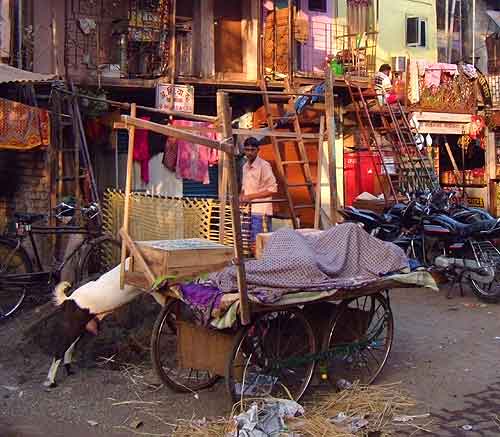
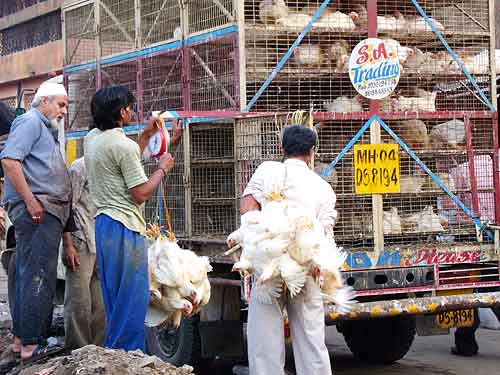
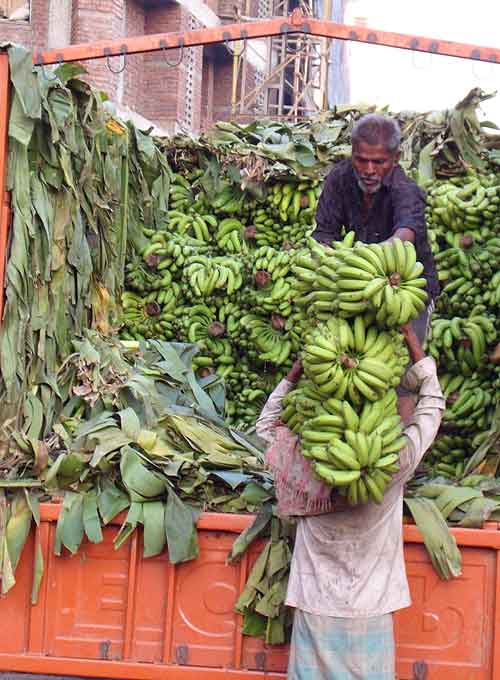
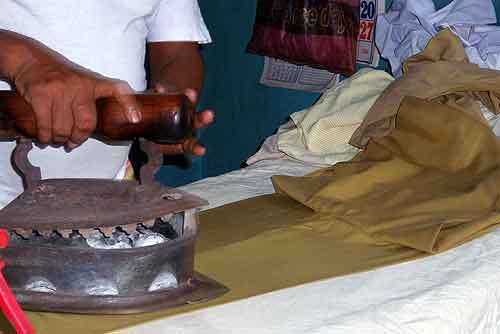
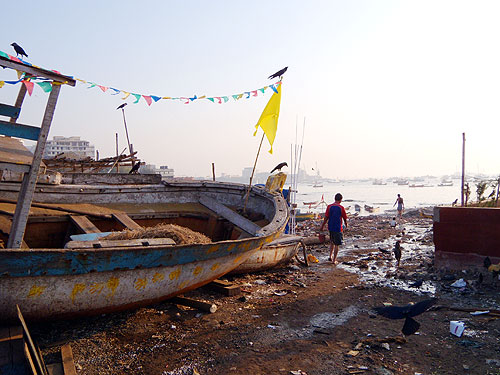
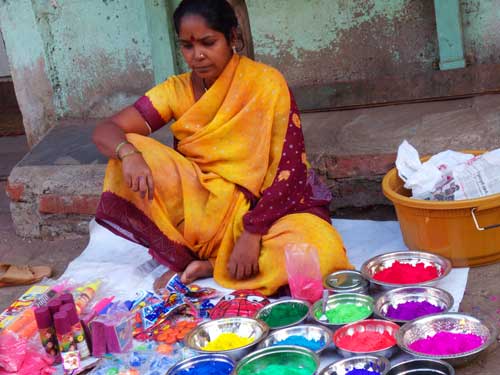
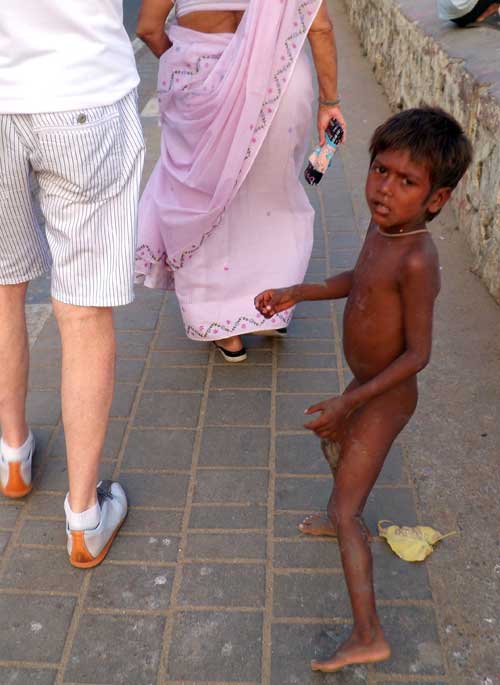
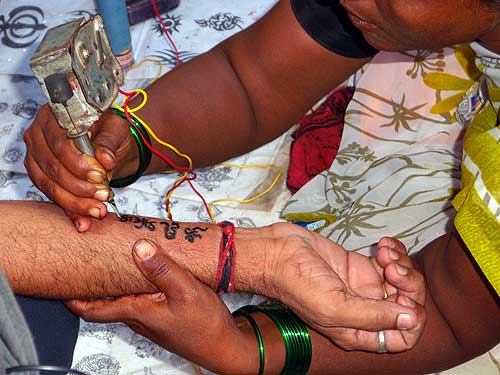
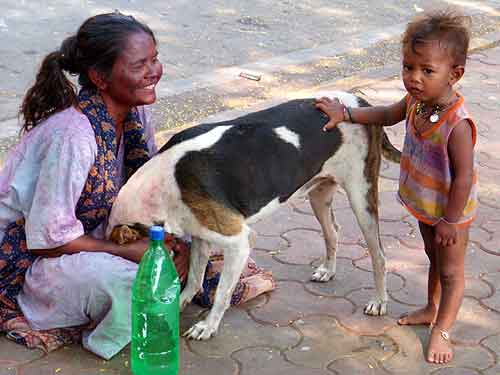
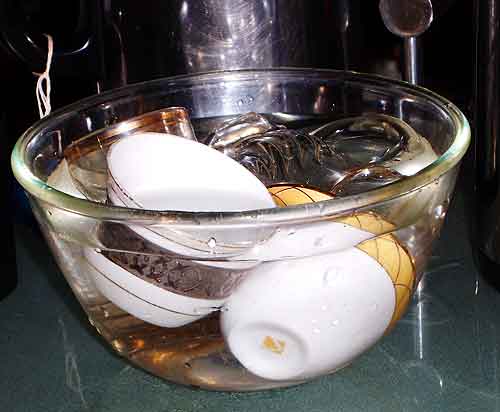


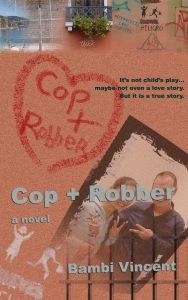
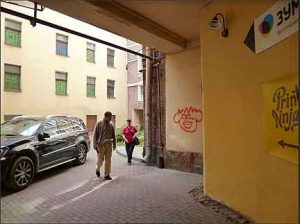
4 Comments
Back again. What photos. Yelm is right. My favourite might be colaba-slum.jpg. Do you know that’s a really really good photo? 😉
What a fantastic read! I would love to tag along one day….
Take me with you, I will carry your bags!
There should be a syndicated Bambi/Bob television show. A mixture of everything you guys do. There should be such a show. I defy anyone to not be entertained/educated/moved by it.
Marvelous photos! Glad you didn’t indulge in street food.